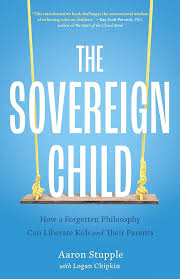
Parent: Dr. Malpani, I’m really struggling with parenting my child. I want to raise them well, but it feels like I’m constantly setting rules and enforcing discipline. I’m worried I’m being too controlling.
Dr. Malpani: I’m glad you brought this up. Have you ever heard of the book The Sovereign Child by Aaron Stupple? It offers a refreshing perspective on parenting that might help you.
Parent: No, I haven’t. What’s it about?
Dr. Malpani: The core idea is that parenting should focus more on fostering understanding rather than imposing rules. Instead of controlling children, parents should provide freedom and security to allow their kids to explore and make sense of the world. Rules can often restrict that freedom and hinder learning.
Parent: That sounds interesting, but without rules, wouldn’t things get chaotic?
Dr. Malpani: Not necessarily. Think about how you treat houseguests. You don’t control what they eat or how they behave—you offer them comfort and respect their preferences. Parenting can work similarly. When you trust children to make decisions and explore their interests, they often thrive.
Parent: But what about things like food? My child constantly demands sweets, and I worry about their health.
Dr. Malpani: Stupple actually addresses that. He points out that when parents control food—like making sweets a reward or punishment—it makes those treats even more tempting. The more you restrict something, the more desirable it becomes. A better approach is to create an environment where healthy options are available without turning food into a power struggle.
Parent: That makes sense. But what about managing their time? My child seems glued to screens all the time!
Dr. Malpani: Ah, the “screen panic”—a common concern for parents today. Stupple challenges the belief that screens are inherently harmful. He points out that every new form of media has faced similar panic—from dime novels to television to video games. The key is to understand that children are naturally drawn to what interests them. When they’re engaged—even on screens—they’re often learning and thinking creatively.
Parent: But doesn’t screen time interfere with their education?
Dr. Malpani: Not necessarily. Stupple argues that screens can actually expand a child’s range of interests. Instead of restricting screen time, parents should engage with their children about what they’re watching or playing. It’s about guiding rather than controlling.
Parent: What if my child encounters harmful content online?
Dr. Malpani: That’s a valid concern. Stupple emphasizes the importance of building trust. If you’re approachable and your child feels safe talking to you, they’ll be more likely to turn to you when they encounter something troubling online. Controlling them too strictly can backfire, as they may start hiding things from you.
Parent: So, you’re suggesting I should be more like a guide than a disciplinarian?
Dr. Malpani: Exactly. Instead of being an enforcer, focus on being someone your child trusts. Stupple warns that excessive rule enforcement can lead to resentment, deceit, or even apathy. Instead, help your child develop an “internal locus of control,” where they feel responsible for their own actions and decisions.
Parent: That sounds great in theory, but what about practical advice? How can I guide my child without constantly saying “no”?
Dr. Malpani: Stupple offers a useful three-step framework:
- Understand the Problem – Start by listening and understanding what your child is struggling with. Don’t jump to conclusions.
- Guess Solutions – Instead of imposing rules, brainstorm ideas together to find win-win solutions.
- Test Guesses and Expect Failure – Let your child try out different ideas. Mistakes are part of learning.
Parent: And what if my child insists on making bad choices?
Dr. Malpani: Sometimes kids need to experience small failures to learn important lessons. The key is to let them fail safely. By giving them space to experiment, they’ll build resilience and problem-solving skills.
Parent: This is quite a shift from traditional parenting. What about teaching values like responsibility and fairness?
Dr. Malpani: Stupple says children naturally develop these traits when they are trusted to explore, make decisions, and experience consequences. For example, creating an atmosphere of abundance—like offering plenty of healthy snacks—helps children learn to regulate themselves without constant supervision.
Parent: What if my child doesn’t respect boundaries?
Dr. Malpani: Stupple points out that rules don’t really teach boundaries—instead, they teach children to obey authority without questioning it. True understanding of boundaries comes from open conversations where kids feel heard and respected.
Parent: So, you’re saying I should focus less on enforcing rules and more on fostering understanding?
Dr. Malpani: Exactly. Parenting is about stewarding your child’s growth in knowledge. Drawing on Karl Popper’s critical rationalism, Stupple emphasizes that knowledge grows best through curiosity, trial and error, and open dialogue—not by controlling what kids can and can’t do.
Parent: This sounds promising, but it’s also a little intimidating. What if I make mistakes?
Dr. Malpani: Mistakes are inevitable! Stupple points out that mistakes are actually a sign of progress. Parenting is about guiding children to become independent thinkers, and that requires trial, error, and trust.
Parent: Thank you, Dr. Malpani. This gives me a whole new perspective on parenting. I’ll definitely give The Sovereign Child a read.
Dr. Malpani: That’s great to hear! Remember, parenting isn’t about perfection—it’s about creating an environment where your child feels safe, loved, and free to explore. Trust yourself, and trust your child. You can buy the book at https://www.amazon.in/Sovereign-Child-Forgotten-Philosophy-Liberate/dp/1544547978 or download it free at https://annas-archive.org/md5/ab73cb64aeb2998dd2902d866ab372b0